The New Netflix Effect: What’s the Next Streamer to Crack Down on Password Sharing?

Netflix is already enjoying the spoils of its crackdown on password sharing. Watch other streamers follow in its footsteps, again; let’s call it the new Netflix effect.
The early returns on paid-sharing are promising. Immediately following Netflix’s note to U.S. subscribers on May 23 implementing the new rules, Netflix had its four biggest days of U.S. signups in more than four years. (Probably longer; that’s just as far back as the Antenna research goes.) At least partially on those efforts to monetize former freeloaders, last week, a pair of Wall Street analysts strongly increased their price targets for Netflix stock (NFLX). The equity analysts at Wells Fargo sees the stock worth $500 per share again in the not-too-longterm future.
More from IndieWire
March research from those same number crunchers estimate Netflix’s paid-sharing plan could bring $3 billion in additional annual revenue. Ahead of its paid-sharing rollout, Netflix estimated that 100 million users were borrowing someone else’s (paid) account; 30 million of them were from the U.S. and Canada. The math checks out.
Yes, it’s a good time to be Netflix, again; and it’s been a while since we could say that with confidence. Now, seeing as how pretty much the entire media industry bent to Netflix’s business plan in the past, who’s next to take a stand on sharing sign-ins? IndieWire polled a cross-section of analysts in the business, from the banks to the blogs. Our findings in a warning: borrowers might want to start bingeing their Disney Bundle bucket list now.

Colin Dixon, the founder and chief analyst at nScreenMedia, sees Max as the next streamer to prevent you from using your dad’s account. Alicia Reese, an analyst at the investment firm Wedbush Securities, had Max as one of her two most likely (first) followers. It makes some sense: with its premium programming, like Netflix, Max has earned its high monthly subscription rates and its low churn.
“If anyone can, it might be Max,” Omar Mejias, an equity analyst at Wells Fargo, echoed. There’s just one problem: “But they just changed apps/name so it’d likely be a ways out.”
Steven Birenberg, owner and president of registered investment adviser Northlake Capital Management, agrees with that assessment. Warner Bros. Discovery execs shouldn’t “distract” from their recent rebrand by immediately following up with a Netflix-like paid-sharing crackdown, he told IndieWire.
Alan Wolk, the co-founder and lead analyst at streaming website TVREV, had yet another reason for Max to stay out of this — again, for now. “With HBO, there’s still a lot of confusion around people switching to Max from their cable subscription,” he told us, “so they probably won’t do any sort of crackdown right away.”
Yes, it can be a bit clunky for some to navigate from linear HBO to the streaming service that no longer even bears the Home Box Office acronym in its name.
But surely some streamer’s got next, right? Maybe not; for a while, at least. “Churn for others is too high so I’m not sure if they want to jump in on that just yet,” Mejias said.
It’s true: one quick way to lose paid subs is to cut off their hand-picked freeloaders. But somebody’s gotta get in on this found-money revenue stream, right?
If not Max, it will be Disney+, Reese said. That’s also the one her colleague, Michael Pachter, picked in a separate conversation. Birenberg sees it the same way.
Reese’s reasoning was the intense and ongoing push toward Disney+ profitability, a pressure probably felt more there than at any other streamer. (Netflix has been profitable for a while now; Hulu is believed to also be profitable. Warner Bros. Discovery’s direct-to-consumer portfolio, which also includes Discovery+ and just turned a surprise quarterly profit in the U.S., is now expected to be profitable for the year.)
A password-sharing crackdown makes sense for any streamer with the following attributes, Reese said:
A majority of their subscribers on an ad-free/premium subscription tier.
An ad-based subscription tier they can offer for ex-piggy-backers.
Must-have content (it’s best if the crackdown occurs around major releases, but consistently-strong releases must follow or churn will just be delayed.)
Check, check, and check for Max. It’s check, check, and sort-of check for Disney+, in our book.

You know what would help? If Hulu were to be fully integrated with Disney+. A full combination beyond the coming (optional) tile would bring more library titles and greater perceived value, and it would help balance out the mix of kids and adult programming. An account-sharing crackdown would help in another way, Jacquie Corbelli told IndieWire.
“Fully monetizing their subscriber base will help address the profitability challenge in Disney’s streaming model,” the founder/CEO of BrightLine, a connected-TV (CTV) advertising-solutions company, said. Mirroring Netflix in this specific way would be “a natural piece” of that “economic equation.”
Wolk concurs with all that — but he’s got an additional point that first and foremost applies to Hulu. Save Netflix, Hulu has been in the game the longest — so why wouldn’t it follow the very streamer it followed into the industry on this one? Wolk also believes there is more Hulu-password sharing than Disney+.
Anyone else? How about everyone else, per Corbelli. Amazon Prime Video “and others” will follow Netflix on the paid-sharing crackdown “within the next 24 months,” she said.
“The profit model for streaming’s industry leaders is under intense pressure, and this is a straightforward and fair way to support subscriber revenue that helps offset the huge cost of providing premium video content,” Corbelli said.
On the subject of the field, Birenberg believes Paramount+ may be “desperate” enough to give paid-sharing a go as a means to getting an immediate one-time subscriber bump. Peacock is least likely to crack down on password sharing due to its ties to parent company Comcast’s broadband efforts, he said.
For going the extra mile, we’re going to give Birenberg the last word here — though his is a sentiment others shared in their own words.
“I doubt any of them make a move before we see how the Netflix crackdown goes in the U.S.,” Birenberg said. “None of the others have the international scale and reach as Netflix, so I think they would be hesitant to mess with their main U.S. market without a proof point from Netflix that it works.”
Additional reporting by Brian Welk.
Best of IndieWire
Sign up for Indiewire's Newsletter. For the latest news, follow us on Facebook, Twitter, and Instagram.

